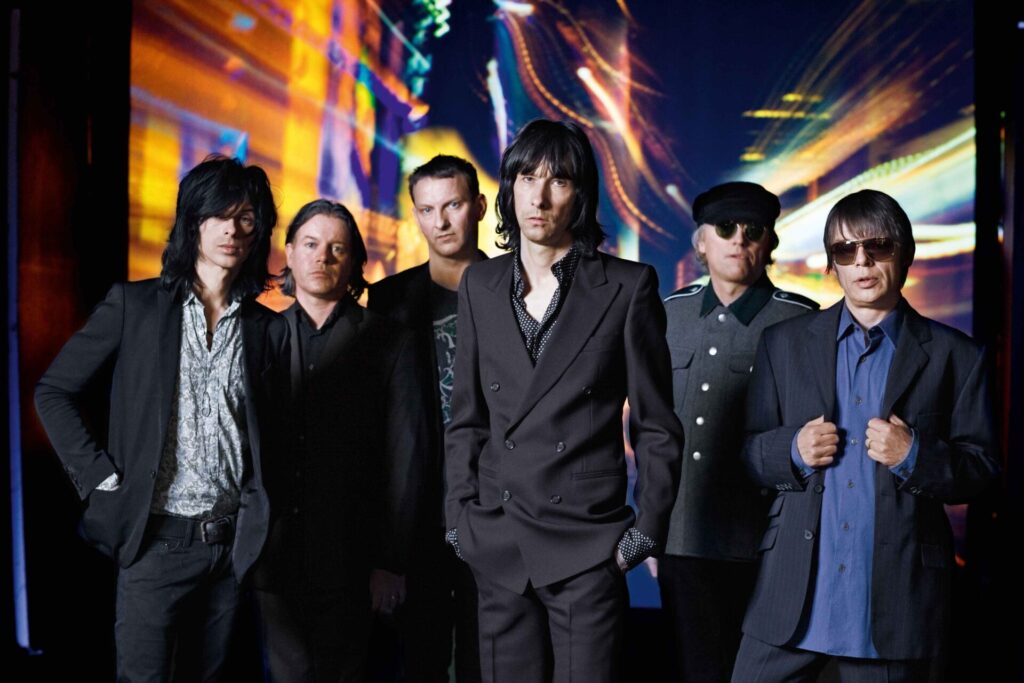“It’s another typical Primal Scream Trojan horse, if you ask me, to come out with a really beautiful melody with a really sick undercurrent with the vocals.” So drawls Primal Scream bassist and former Stone Rose Mani in a Mancunian accent so thick and chewy you could spread it on toast and eat it as a deliciously nutritious snack.
He’s not wrong either. Not for the first, or indeed, the last time, Primal Scream have once again taken yet another of their stylistic u-turns and frankly, who can blame them? Their last effort, 2006’s wretched Riot City Blues, was the unmistakable sound of a band flicking on the cruise control switch as any pretence of creativity and drive was sacrificed in favour of yet another Rolling Stones/New York Dolls/13th Floor Elevators tribute that at least had the good taste and decorum to hang around for less time than their previous pastiche collection, Give Out But Don’t Give Up.
Yet be that as it may, no one was expecting Primal Scream to deliver – on the surface at least – a pop record. Clipped, clean and clappy, Beautiful Future, like Vanishing Point before it, is a carrier album, one that lacks the catalyst clout of Screamadelica and XTMNTR while managing to avoid the crap of their Stones default setting as it suggests what might come next. So does this new, shiny sound mean that Primal Scream are mellowing out?
Not so, according to Bobby Gillespie: “I don’t think we’re mellowing out at all.” He continues in a soft voice that belies a life spent with the pedal pressed firmly against the metal: “I think that just because a record becomes more melodic or euphoric doesn’t mean that your view of the world or the way you feel inside has changed, it’s just a different approach to making music, that’s all. The lyrical content is just as…it’s not got any softer, y’know? If anything, it may be more extreme in places so it’s just another way of putting your ideas across.”
“It’s like harnessed psychosis, this one, y’know?” adds Mani.
Indeed. Any notion of the band getting comfortable with the state of the world is soon quashed by Gillespie: “In the last five or six years there’s been an acceleration of fan magazines, celebrity magazines and the fact that there’s no real news on the TV anymore,” he begins. “If Lily Allen wears a pink dress and pink hair then it’s on the fuckin’ news while meanwhile Britain is involved with two of the longest wars it’s been involved with in the last hundred years and that’s Iraq and Afghanistan.
“There’s a lot of fucked up sick shit happening but people are blinded to it by the way the media’s controlled and I can’t help but react to that. It may be that the freedom that we have here is bought at a price and that price is torture in Iraq. I don’t wanna be too negative; I love our record, it’s a pop record but I think you’ve got to say what you’re feeling and write about it.”
Gillespie pauses and lets out an almost apologetic sigh. Though his rhetoric may be painted with the broadest of brush strokes, there’s little doubting his sincerity or what he believes what music can achieve.
“The power of the music is revolutionary,” he continues “because it gives you a sense of self, frees your imagination and frees you to be yourself and suddenly you’re not part of the adult world but in a world of your own making. So I think that’s where rock & roll is revolutionary.”
Even Gillespie seems exhausted after his political outpouring and it’s a side to the singer that acts as ammunition to his many detractors who gleefully point out that his insurrectionist clichés belong to another era altogether. Perhaps so, but Gillespie’s enthusiasm for what music can achieve is undeniably infectious and talk soon returns to the creation of Beautiful Future.
As with previous efforts, Beautiful Future is characterised as much by the company it keeps as the music it produces. Featuring guest appearances from CSS’ Lovefoxxx, Josh Homme from Queens Of The Stone Age and folk legend Linda Thompson, Gillespie is nothing less than effusive in his praise for his collaborators and his reasons for choosing them.
“It’s the production,” he begins. “If you’re record producer you would get the best musicians to serve the song and then make it a great record and that’s all we’re doing here. We don’t ask people lightly because we want then to add something to the track and that’s all there is to it really.”
He continues: “It’s pretty simple, right? With the Lovefoxxx one (‘I Love To Hurt (You Love To Be Hurt)’), it was an electronic track and we felt we needed a girl vocalist to sing alongside me; we loved the CSS record and her voice sounded good against electronic music…and that’s why we asked her. With Linda Thompson…she’s very deeply emotional as a singer and her voice carries a lot of weight so she was right for that song (a cover of Fleetwood Mac’s ‘Over & Over’).
“And Josh Homme, I think he’s one of the best guitarists in the world and there was always talk of both bands playing or recording together. [‘Necro Hex Blues’] evolved from a jam and we constructed a song from the live instrumental jam.”
Gillespie’s love of Primal Scream and where the band is currently at is palpable. “I think we’re just getting better at what we do,” he says with a proud smile. “My personal opinion is that we’d had such a good year two years ago with Riot City Blues and had a hit record with ‘Country Girl’ and had such a great tour that we just wanted to get back into the studio, write an album and get back onto the road as soon as possible.”
Or, as Mani so succinctly puts it: “That’s not bad for a bunch of junkie no marks!”



